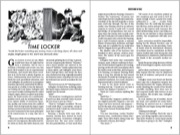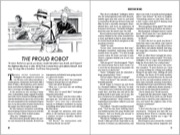| Theris Nordo Ichka |
If I saw this book in a bookstore without knowing anything about Henry Kuttner, I wouldn’t even pick it up. Why? The cover art.
If it’s not too late, I’d suggest a different cover illustration. One with more of a feeling of science fiction, imagination, and fun than a big white head can convey.
Many of your other book covers are very reminiscent of the pulps, I like that a lot. It gives this series a classic feel.
This set of Kuttner stories, some of Kuttner’s best, deserves a better cover.
 Illessa
Illessa
|
If I saw this book in a bookstore without knowing anything about Henry Kuttner, I wouldn’t even pick it up. Why? The cover art.
If it’s not too late, I’d suggest a different cover illustration. One with more of a feeling of science fiction, imagination, and fun than a big white head can convey.
Many of your other book covers are very reminiscent of the pulps, I like that a lot. It gives this series a classic feel.
This set of Kuttner stories, some of Kuttner’s best, deserves a better cover.
All the books from Outlaws of Mars (Feb 2009) on have mock-up covers at the moment, I assume this is no exception (though I've no idea where it's from, I recognise all the others from Pathfinder). I totally agree that if the current art is final then it's kind of lame (if I saw that in a shop, I would assume serious, AI-based hard science fiction, and would probably pass it over unless I knew the author, plus it would look kind of out of place in a Planet Stories collection), but hopefully Paizo are coming up with something suitably awesome for the final thing and we'll see it in the next few months :).
 Mark Moreland
Director of Brand Strategy
Mark Moreland
Director of Brand Strategy
|
I special ordered this in January from a local bookstore who said their distributor was all out and they'd have to get more from the publisher, but now they're telling me that it's out of print or at least unavailable to the distributor. While I could get it straight from Paizo, I'd love to support my independent bookseller. Any idea why they can't get this book?
 Vic Wertz
Chief Technical Officer
Vic Wertz
Chief Technical Officer
|
I special ordered this in January from a local bookstore who said their distributor was all out and they'd have to get more from the publisher, but now they're telling me that it's out of print or at least unavailable to the distributor. While I could get it straight from Paizo, I'd love to support my independent bookseller. Any idea why they can't get this book?
We have plenty; they should have no problems. Who are they?
| Chris Self Former VP of Finance |
I special ordered this in January from a local bookstore who said their distributor was all out and they'd have to get more from the publisher, but now they're telling me that it's out of print or at least unavailable to the distributor. While I could get it straight from Paizo, I'd love to support my independent bookseller. Any idea why they can't get this book?
Also, Diamond Books, our supplier to the book chain, has plenty in stock.
There should be no reason at all that they can't get it.
 Mark Moreland
Director of Brand Strategy
Mark Moreland
Director of Brand Strategy
|
They don't have an account with Diamond, but use Ingram as their primary book distributor. They also use Bookazine. The store owner said that her computer system shows 14 copies on order from Ingram but that they only get shipments from the Pennsylvania warehouse and not the Indiana one, which apparently does have copies in stock.
| Chris Self Former VP of Finance |
They don't have an account with Diamond, but use Ingram as their primary book distributor. They also use Bookazine. The store owner said that her computer system shows 14 copies on order from Ingram but that they only get shipments from the Pennsylvania warehouse and not the Indiana one, which apparently does have copies in stock.
Sounds to me like your store's manager needs to get his Ingram sales rep to give the Ingram buyer a few words about warehouse allocation. (Ingram buys from Diamond, just to be clear.)
It frustrates me more than a bit when the distribution chain breaks that far up the line from us. I'm glad that the hobby distribution chain has fewer links.
 Zuxius
Zuxius
|
Here is my honest to God book review of Robots Have No Tails. There was a time at PathfinderChronicler.Net when we ran a huge gamut of articles related to Paizo, now we only publish Pathfinder Fiction stories. So, I have gone and dusted off my review so I may leave it here, where I feel it can serve Planet Stories best.
Robots Have No Tails is a series of short stories surrounding a not so tragic figure. These short stories always start with our inventor, Galloway Gallegher, having problems remembering what it was he had invented. There is a consequence to this memory loss, because his investors are usually becoming upset enough to take drastic action. As a person, Gallegher is a completely irresponsible person that has made a living by getting drunk and inventing something he has no recollection of. In turn, his invention (or soon to be built one) fetches an advance in credits he rarely sees while conscious. Welcome to page one of each of these stories.
If there is one word that must be used to describe this collection of Henry Kuttner stories, it has to be precision. From the beginning, Kuttner sets up each story like a mystery. The question being: what happened while Gallegher was unconsciously drunk? To answer this, Kuttner quickly injects several elements into his stories that are intriguing and fairly concerning. The invention created by Gallegher is an unknown factor as are the people’s motivations that hired him. The only thing that helps are the witnesses to Gallegher’s mad inventing. Kuttner cleverly adds clues via several personalities: Gallegher’s father, Narcissus (Joe) the Robot and the scary “wanting to conquer the world” Lybblas. Couple these characters with the clients that hired him, and you have a story that moves at a brisk pace.
Robots Have No Tails is a humorous tightly written collection. For any writer having doubts on writing their own short story, they needn't look further than this book. Not a page is wasted by Kuttner's writing style. Each element of the story that seems unrelated or "in the background" has a part to play in the conclusion. As Gallagher makes his way to the truth, we get to see what kind of man this inventor is. Quite often, he is the victim. He is also a sleuth and an unwitting adventurer. He likes to have fun and wants to better his situation. To be exact, he is someone like us, but in a bad situation. We never really see Gallagher's genius as a scientist but we live with the aftermath of his dealings and inventions.










